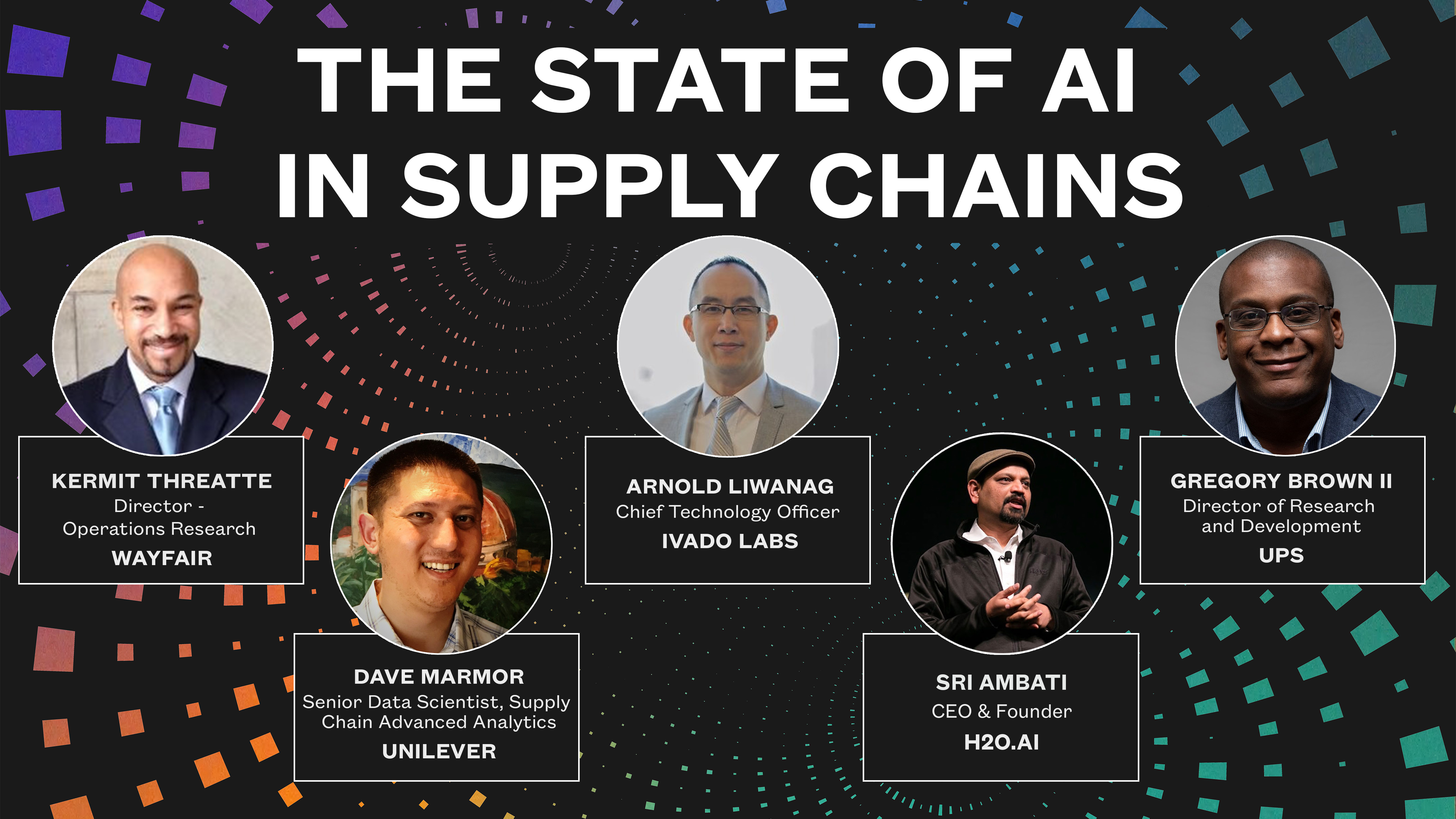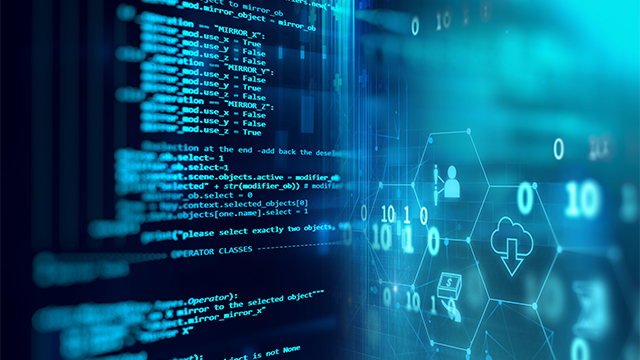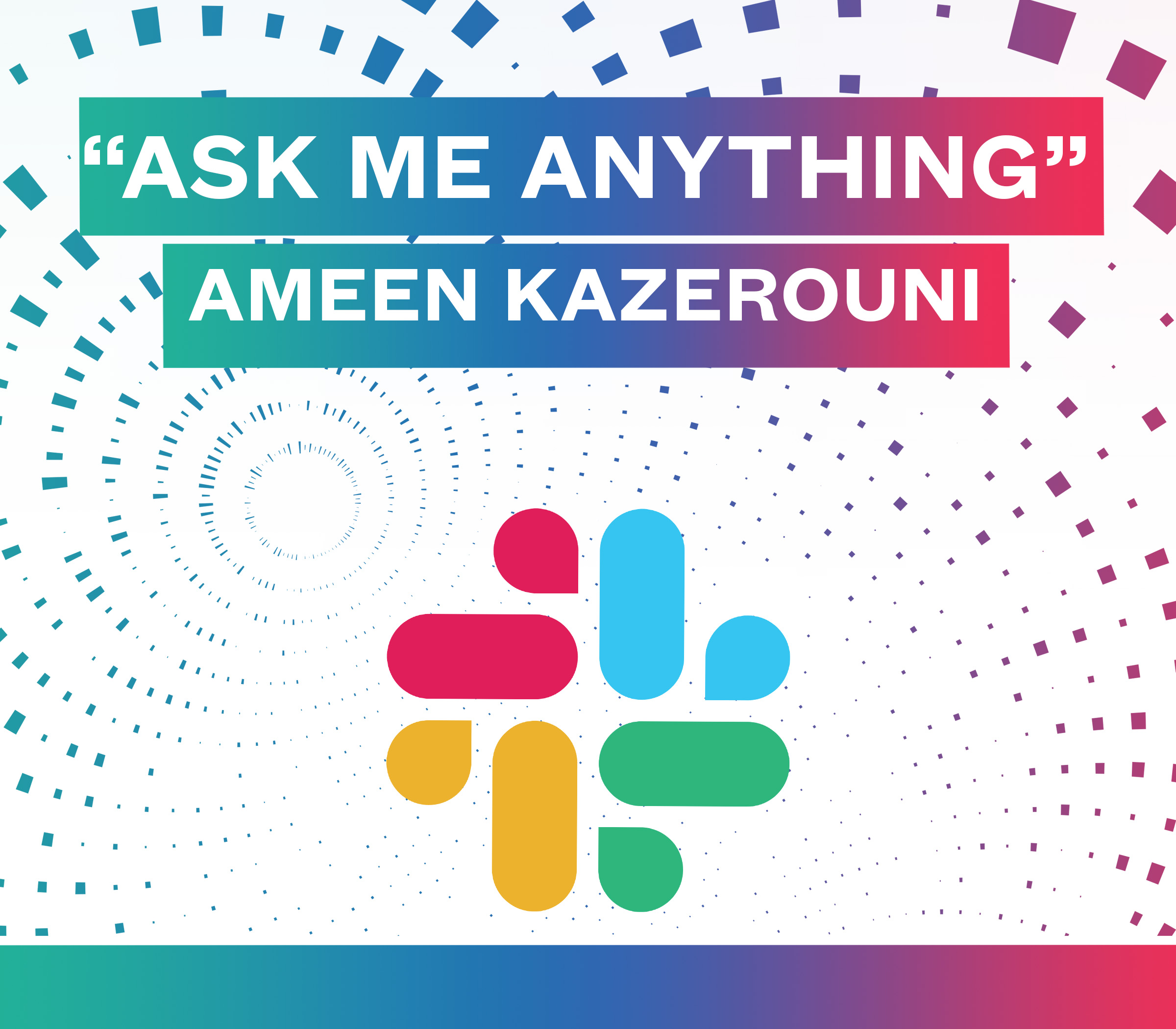 BACK
BACK

During this panel, industry experts (showed above) discussed the impact of COVID-19 on AI on Supply Chains. We’ve included a short transcription of the panel, beginning at 11:25 of the webinar.
Kermit Threatte, Wayfair: So for this first question is: COVID-19 led to dramatic disruptions in the global supply chain. Do you expect companies to reexamine their operations and increase their focus on AI? Arnold, why don't you give it a shot and then the rest of us can kind of chime in with our opinions.
Arnold Liwana, IVADO Labs: Yeah, sure. So I mean obviously this is affecting the world. Everybody's directly affected by the COVID-19 crisis. In terms of our client base, we've been lucky in the sense that it's really driven a lot of work towards us and opened a lot of our clients’ eyes and our peers to the importance of, not only AI and applying that to the supply chain, but also digitization in general. So number one, this is definitely accelerating the digitization journey of a lot of companies, and by that same token, then they're just layering an AI right at the same moment.
So this has been really a good situation to really drive that agenda quickly and accelerate that. That's what we've been seeing. How COVID is affecting this came mostly from a disruption perspective. That's what they're trying to deal with and those are the types of questions that are coming up right now. There's so much disruption in the supply chain and there already was a level of uncertainty in it. And now that uncertainty has kind of gone up significantly. So now everybody's trying to use AI to not only predict and react faster to these changes, but also to better adjust faster to how they can reconfigure their supply chain. And in this situation, AI sometimes is the only way to calculate that really quickly.
Kermit Threatte, Wayfair: Got it. Now, does anybody else want to contribute?
Gregory Brown, UPS: I'll take a stab at this one as well. When you look at the COVID situation that's out there today, it certainly has changed the world. I mean a few months ago people did not worry about being within the vicinity of someone else and touch was not an issue. To me, I was on a panel last week and I highlighted this point. I saw a commercial for Papa John’s and they were advertising that when the pizza comes out of the oven, no one touches it. That just highlights the world we’re in where people care about the touching of the things that are coming into their homes. To me, that really makes everyone think about a supply chain that is driven by reduced touches.
I think AI is a big player in enabling an AI supply chain that takes out the human element or the human pieces that are in the supply chain today. UPS inadvertently has been working on a number of solutions that were already targeting the supply chain. If you may have seen the news, TuSimple, the autonomous feeder for the long haul or delivery Waymo Autonomous Vans, we have drones that are doing delivery and smart warehousing and so on. You start looking at the holistic portfolio that UPS is building and certainly could enable a world where we start to adapt to these pandemic situations where you need to go to a reduced touch type of supply chain.
Sri Ambati, H2O.ai: And the things you have seen have gotten even more disruptive in the sense that distributions and the Global Supply Chain has faced its first shock as experienced by the PPE and lack of some cleaning supplies to toilet paper. Many of us have personally experienced some of that. China used to be our warehouse for the world or manufacturing source for our world but disruption came from the source.
A lot of our customers are beginning to rethink where to put factories, where to put distribution centers. For example, we saw in Malaysia and Brazil. The rise of COVID cases was proportional - almost a direct correlation - to sales of cleaning supplies and so on and so forth.
Of course pantries have never been this busy, people filled up their pantries, which means that some of that stuff will not be bought or sold again for a little while. And in addition to that, I think the pressure that the world has been seeing on cities’ densely populated areas. We've seen exodus mobility data indicate an exodus from cities at this point both globally and some of that Mobility data is showing how folks from New York have now come, not just to Florida, but along the highways. So new sources of demand are emerging and so the population from the cities is now expecting things from the local Walmart and the local Target in a rural area. So that's changing how FCMG (Fast-Moving Consumer Goods) companies are beginning to see how to distribute and how to be more accessible for even the premium products in places they'd never expected before.
Jobs are the biggest story of today. A lot of job loss means that people are going to see very different modes of consumption but mostly e-commerce and online electronics. Some more some of us have bought home printers for the first time and upgraded home equipment. A lot of that change has brought a substantial transformation of the supply chain going forward and I think this is not going to be a short-term effect. I think we can expect digital work to be on the rise, which means less transportation, less public places. So this is called BC, as in before COVID, and everything after that is now going to have to adapt to be socially distant but spiritually connected and work.
Kermit Threatte, Wayfair,: Yeah from my perspective, there's kind of an immediate direct application and it's probably more reactionary than anything else. You have all these supply chain systems that have forecasts, whether they're sophisticated or not or driven by AI, and there's nothing historically that can match what's going on. So adjustments have to be made and they probably have to be done rapidly. So how do we, as an industry, react to that and think about it. By the way, that's not just for now while the pandemic is going on, but even a year from now or beyond that, you're still going to have this destruction in the data set. So you're going to have to correct that to use it and that's kind of immediate ‘how do we handle that.’ Then in terms of structure or new technologies and that sort of thing, that's kind of a question for me. Because there is an immediate response that’s necessary. There are all sorts of issues out there with this emergency situation. So companies are triaging where they put their time and effort and people are trying to stay afloat or try to either deal with less volume, more volume, or whatever is going on. So my question is, some people are going to reinforce the focus on technology using AI sooner rather than later and other people might not be able to or might have to delay it.
Sri Ambati (H2O.ai): There is a lot of transfer learning to be had from the 1918 side of COVID where we had an initial bump, a second big bump, and a third bump versus the H2N2 which was more of a single episode. So, how can we learn from top-level different scenarios and then a lot of the data, as you said, before COVID is no longer relevant. Some companies that can learn quickly as the charts are changing are putting that infrastructure together; it becomes paramount. The third one is, most of the models we are looking at now are simple math. So it's not actually the complex math that is going to help, it’s very simple poisson distribution. Obviously, we all saw that in the COVID-19 cases, but just a simple, better understanding of the space but very simple application math is what we're seeing being widely used that can be interpretable and people can learn from that and apply again and again.
Recent Posts

Developing Computer Vision Applications in Data Scarce Environments
Introduction In today’s digital era, computer vision stands as a transformative technology, driving innovations across...
By Sumedh DatarDecember 12, 2023

Bottlenecks in Supply Chains & How AI Can Help
During this panel, industry experts (showed above) discussed the impact of COVID-19 on AI on...
By Ai4May 05, 2020

“Ask Me Anything” with Zappos’s Head of AI/ML Research & Platforms, Ameen Kazerouni
Ai4 recently hosted an “Ask Me Anything” session with one of our speakers, Ameen Kazerouni,...
By Ai4March 19, 2020